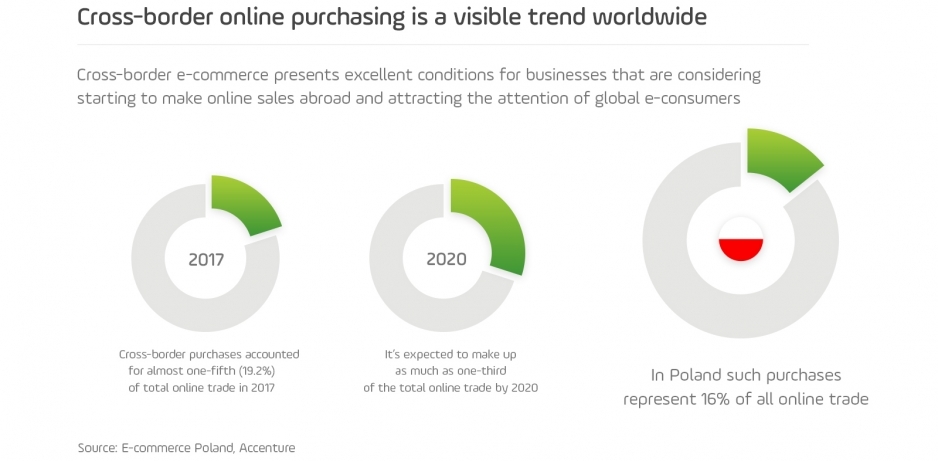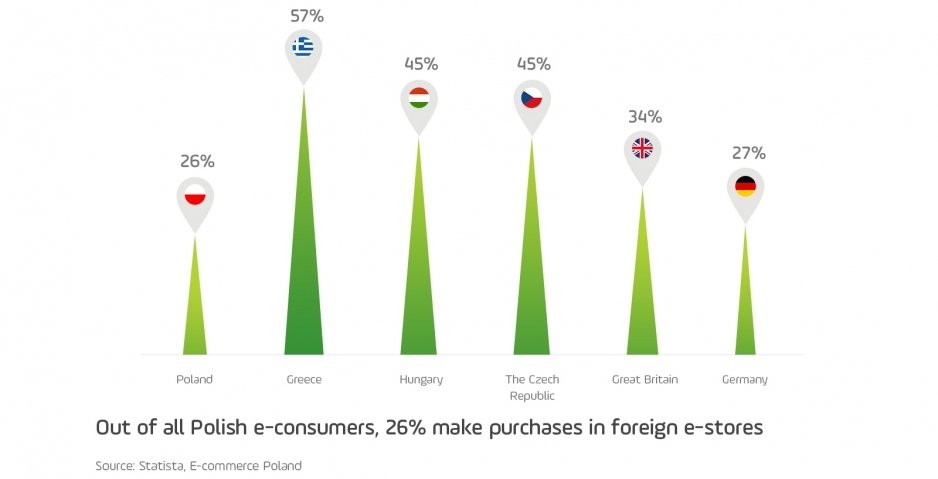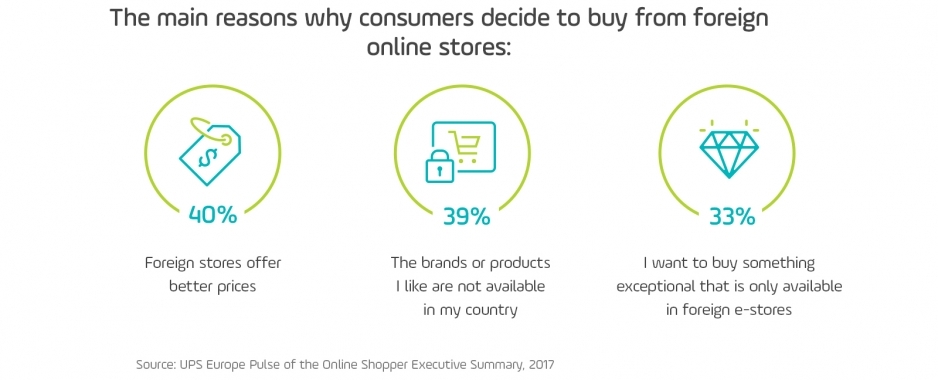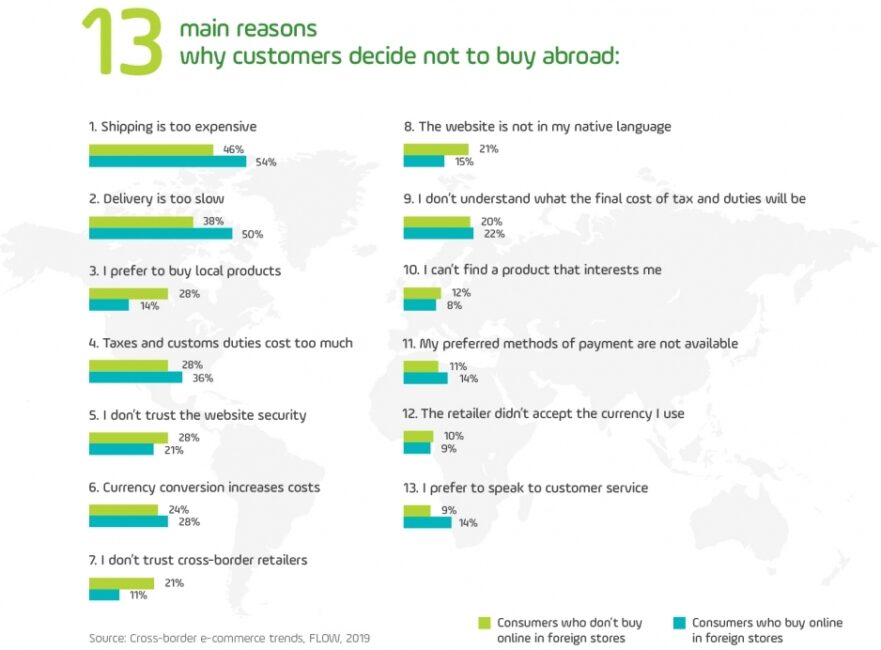-
Our solutions
- Our solutions
- For business
-
About us
- About us
- Offer
- Partners
- Support
Why is it worth selling products to other countries?

The e-commerce market in Poland and worldwide is gaining strength at a great pace, with the value of online sales growing four or five times as fast as total retail sales. At the same time, we can see changes in the way people are buying online – they are switching to mobile devices, making fast online payments, and getting used to the possibility of free returns. Also, more and more e-consumers are opting to buy from e-stores based outside their home country. What impact does this have on the functioning of e-stores and the e-commerce sector overall?
Cross-border e-commerce is developing extremely fast and changing the face of online purchasing. It refers to the sale or purchase of products and services through e-stores from other countries. The buyer and seller are located in two different parts of the world, they may use different currencies and languages, and they are subject to different laws.
At PayU, we have been supporting the development of e-stores of all kinds for many years, accompanying them in keeping up with global trends. With a view to the huge potential of cross-border e-commerce, we provide advice on how to make use of this trend to build effective competitive advantage in the digital world. This article is the first in a new series about cross-border e-commerce, which will help you:
E-commerce is constantly evolving and growing. The projected total value of e-commerce worldwide in 2020 is as much as $3 trillion (1). The most dynamic growth is expected to come in cross-border e-commerce – cross-border transactions are forecast to grow from $401 billion in 2016 to $1 trillion in 2020 (1)!
Cross-border e-commerce is constantly changing. In most European Union countries, the percentage of e-consumers who also buy from foreign e-stores is high, and continues to rise.

Polish e-consumers are increasingly often visiting foreign stores that offer to ship products to Poland. Although, compared with other European countries relatively few Poles buy in foreign e-stores, their openness to cross-border shopping has risen by three percentage points compared with a year ago, and this trend can be expected to be maintained, according to the report E-Commerce in Poland 2019 prepared by Gemius for E-Commerce Poland (2).
Polish e-businesses will be sending more and more goods to foreign customers. At the same time, competition will increase on the home market, as more and more firms from neighbouring countries – and from further afield – launch e-stores in local versions, friendly to Polish online consumers. For Polish e-stores this means increased competition, and so an essential step in their expansion should be to start selling to customers in other countries as quickly as possible – says Joanna Pieńkowska-Olczak, Country Manager for PayU in Poland.

Online sales to other countries represents an opportunity to generate satisfactory turnover, especially given that the domestic growth might be limited by the high level of competition in the Polish market. Unfortunately, many e-businesses are still not keeping up with the rate of change – they have not fully adapted to the new conditions, and they are not always fully aware of the almost unlimited possibilities that the Internet offers them.
Most Europeans are more willing than the Poles to shop at foreign e-stores. In Greece the figure is 57% of e-consumers, while in Hungary and the Czech Republic it is 45%, and in the UK 34%. The situation is different in our western neighbour Germany, where only 27% of customers buy from foreign stores.
It also turns out that our neighbours spend much more on average on their online purchases. The Polish average is close to €32, while Slovaks spend almost twice as much (€57.15). In Romania the figure is €51.84, and in Hungary €51.42 (3).

To encourage consumers to buy from foreign e-stores, the European Union has introduced rules to prohibit geoblocking in online trade. These lay down that consumers from all EU countries have the right to buy products from e-stores in other countries. This not only makes life easier for customers, but above all it creates a huge opportunity for Polish firms. It means that they will be able to ship more and more goods abroad, thus increasing their turnover. At the same time, competition at home will increase, as Poles make more and more purchases in foreign e-stores. There are no doubts that cross-border sales is an essential direction of growth for every e-commerce company.
The main reasons why consumers decide to buy from foreign online stores are these (4):

From the customer’s perspective, the county of origin of an e-store may matter. In cross-border trade there is an effect known as “home bias”, where purchasers prefer to buy in the domestic market. In the case of online purchases, consumers are 16 times more willing to buy something at an e-store from their own country than abroad. Fortunately, this is changing, and more and more customers are becoming open to buying from abroad. Interestingly, some e-stores are so well adapted to the local market that customers are often not aware that they are buying a product from another country.
The greatest concern for those buying from abroad is logistics – shipping costs are often much higher than those of domestic suppliers, and waiting times can be very long. Customers also draw attention to problems related to payments. Currency conversion rates are too high, and they are not able to use their favourite local methods of payment. Detailed information is given below.

When launching an online store in foreign markets, you have two basic options to consider:
Marketplaces are an excellent choice for smaller stores, making it easy to take the first steps in cross-border sales. They allow to make a start without creating a full new version of e-store adapted to a particular foreign market. Marketplaces let you get to know the specifics of trade in that country – for example, to broaden your knowledge about the purchasing preferences of customers there. In this case, a typical path would be:
Remember that it is not enough just to place your offer on the site. You must also set aside an advertising budget for promotion within the marketplace – to ensure that your products are seen by customers who will be interested in them.
The second option is about creating versions of your store adapted to local markets. This route requires more preparation, and you should normally expect to do the following:
If you choose this option, you should begin by analysing the market and creating a suitable comprehensive strategy for expanding your e-commerce business. There are as many different solutions as business models – everything depends on the goals and capabilities of your e-store.
In this article we provide some general data and indicate the direction of development of e-commerce in the context of cross-border trade. In future articles you will find discussion of some specific markets, which will help you decide which countries to try to sell your products to.
These are unquestionable positives that stem from selling online to markets outside a home country. Although such a move comes with many challenges, it is worth taking them on if you want to expand your business.
We will shortly be publishing articles about cross-border e-commerce that will be full of practical advice, helping you to learn more about the topic and to take the first steps towards international expansion.
When you decide to start selling to other countries, you should look at the challenges which await you and which you, as an e-businessperson, need to consider. Factors that should be analysed include:
Insufficient knowledge about the professional running of an e-commerce enterprise is problematic not only in case of foreign expansion, but also just for running an e-store competently in Poland. So if you are thinking about trading across borders, consider the complexities. You can gain concrete and practical knowledge from our series of articles, so we encourage you to follow this blog.
The success of an e-store in a foreign market is directly linked to knowledge about that country. What is the competition? Which players control shares of the market, and what strategic actions are they taking? What are the preferences of local e-consumers? Are there any sociocultural differences in that market? Maybe there exist strong trends that do not apply to Poland, but play a dominant role elsewhere? Lack of this type of knowledge can lead to numerous errors, which might subsequently cause the e-store to fail.
This is one of the key success factors in cross-border e-commerce. Both the time and cost of delivery are important, as both of these things have a huge impact on customers’ purchasing decisions. Logistics costs, or more precisely their asymmetry, present a further challenge in cross-border e-commerce. It is sometimes much more expensive to ship goods from Poland to another European country than from that country to Poland. This is a factor that strongly impacts the competitiveness of Polish e-stores. However, the situation has recently started to improve. There are more and more firms that specialise in cross-border logistics, and a new European Union regulation is intended to ensure that the market for cross-border package delivery becomes more transparent and competitive. We will deal with the subject of logistics in a separate article.
One of the most important elements of entering new markets is adapting to the habits of online consumers, and this includes the issue of payments. If you are starting to sell in other countries, you must find out what payment methods are used most commonly in the local market. Most importantly, remember to offer the possibility of payment in local currencies. It is also a good idea to accept different payment methods. While most Western European markets prefer online payments, some EU countries still prefer to pay cash on delivery – although this is gradually changing. PayU can help firms considering foreign expansion to adapt their payment methods to specific markets, to prepare payment forms in local languages, and to settle transactions in different currencies. This is made possible by a simple single API integration with the PayU Hub, a global platform, which provides online stores with even wider access to local payment methods throughout the world.
Creating a new language version of an online store and adapting it to local conditions is only half the road to success. An important factor that you should consider is the need to obtain good-quality traffic from the market in question, and to persuade customers to buy at the store. Just like when doing business in Poland, the actions you take should be wide-ranging. Consider building diverse channels for acquiring customers – including SEO, SEM, social media, and working with influencers. It is worth using the assistance of local specialists, who will help you create an action strategy suited to the local market. Of course, you should set aside an adequate budget for actions of this type, particularly at the start of your expansion.
The lack of a worked-out long-term action strategy is a significant problem for many online businesses. Many decisions that are important to the firm are taken on a day-to-day basis. Online stores that want to operate in several markets simultaneously should have a strategy that will allow them to operate efficiently and effectively. If you lack such a strategy, you may not be in a position to fight on level terms with local competitors, who usually know the cultural and legal environment better than you do. In this case there is no single universal method that works in every case. You need to match your strategy to the nature of your e-business. Sometimes a better solution will be to centralise processes; sometimes the reverse. From the very beginning you should analyse the situation, be flexible and ready for change, so that you can constantly learn and adjust to the new market.
Cross-border e-commerce offer huge possibilities to online businesses. It gives you an opportunity to expand your operations beyond the saturated local market and try your chances in other countries. It also let you discover and develop the potential of particular ranges of products, which often cannot be done in the local market; and the expansion of your customer base leads to an obvious result – it increases your sales.